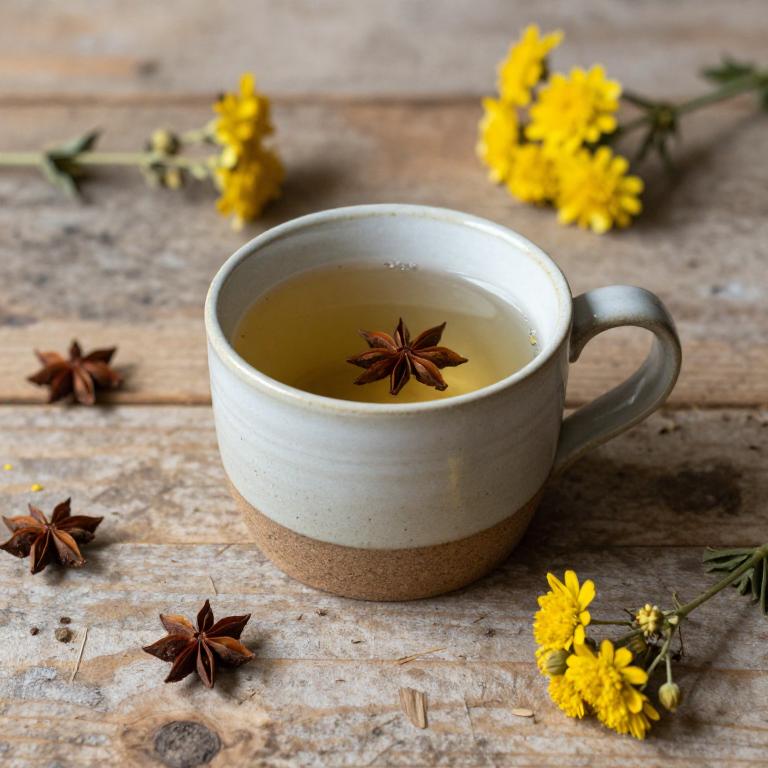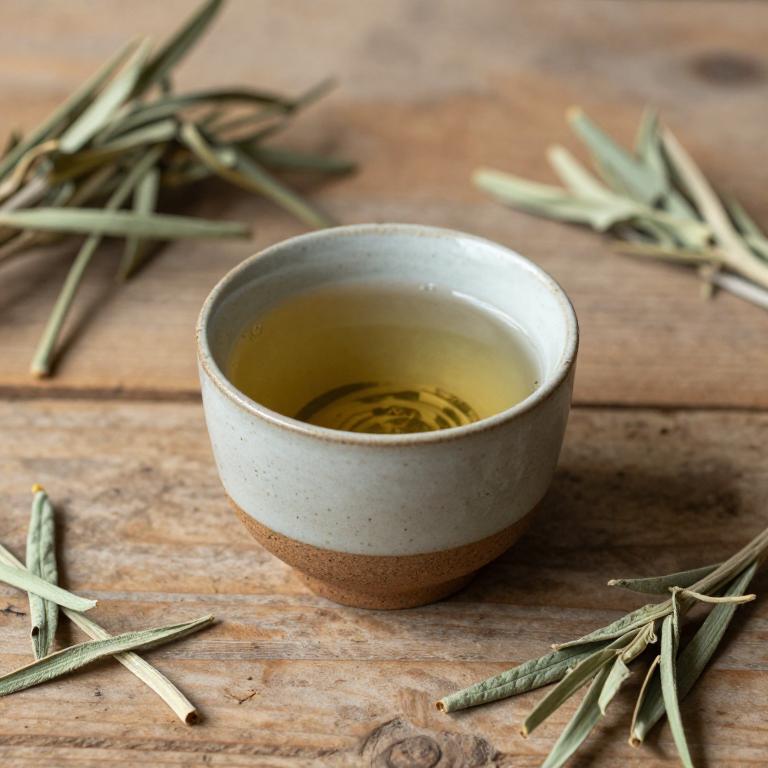10 Best Herbal Teas For Bloating

Herbal teas are a natural and effective remedy for bloating, offering a soothing alternative to over-the-counter medications.
Common herbs used in these teas include ginger, peppermint, fennel, and dandelion, all of which have properties that aid in digestion and reduce gas. Drinking herbal tea can help relax the digestive tract, ease discomfort, and promote the release of trapped gas. These teas are typically caffeine-free, making them a safe option for regular use.
For best results, it's recommended to drink them warm, either before meals or after, to maximize their digestive benefits.
Table of Contents
- 1. Fennel (Foeniculum vulgare)
- 2. Chamomile (Matricaria chamomilla)
- 3. Thistle (Silybum marianum)
- 4. Cumin (Cuminum cyminum)
- 5. Licorice (Glycyrrhiza glabra)
- 6. Anise (Pimpinella anisum)
- 7. Lemon grass (Cymbopogon citratus)
- 8. Dog rose (Rosa canina)
- 9. Turmeric (Curcuma longa)
- 10. Ginger (Zingiber officinale)
1. Fennel (Foeniculum vulgare)

Foeniculum vulgare, commonly known as fennel, is a popular herb used in herbal teas to alleviate bloating and digestive discomfort.
The seeds of the fennel plant contain compounds like anethol, which have mild antispasmodic and carminative properties that help relax the gastrointestinal tract. Drinking fennel tea after meals can reduce gas and ease the sensation of fullness in the abdomen. It is often recommended for individuals experiencing bloating related to indigestion or gas buildup.
However, it is important to consult a healthcare professional before using fennel tea, especially for those with existing medical conditions or who are pregnant.
2. Chamomile (Matricaria chamomilla)

Matricaria chamomilla, commonly known as chamomile, is a popular herbal tea often used to alleviate bloating due to its mild sedative and anti-inflammatory properties.
The tea works by relaxing the smooth muscles of the gastrointestinal tract, which can help reduce gas and discomfort associated with bloating. Chamomile also contains compounds like apigenin that may aid in digestion and ease stomach upset. It is typically consumed as a warm infusion, making it a soothing and accessible remedy for digestive issues.
However, it is advisable to consult a healthcare professional before using chamomile, especially for those with allergies or existing medical conditions.
3. Thistle (Silybum marianum)

Silybum marianum, also known as milk thistle, is a herbal remedy commonly used in teas to address digestive issues such as bloating.
The seeds of this plant contain compounds like silymarin, which are believed to support liver function and reduce inflammation in the gastrointestinal tract. When consumed as a herbal tea, silybum marianum may help ease bloating by promoting digestion and reducing gas buildup. It is often recommended for individuals experiencing occasional discomfort from overeating or indigestion.
However, while it is generally considered safe, it is advisable to consult a healthcare professional before using it, especially for those with existing health conditions or taking other medications.
4. Cumin (Cuminum cyminum)

Cuminum cyminum, commonly known as cumin, is a popular herb used in herbal teas to help alleviate bloating and digestive discomfort.
The essential oils in cumin, such as limonene and cineole, have carminative properties that aid in reducing gas and promoting digestion. When brewed into a tea, cumin can soothe the digestive tract and ease symptoms like abdominal distension and cramping. Regular consumption of cumin tea may support overall gut health and reduce the frequency of bloating episodes.
However, it is advisable to consult a healthcare professional before using cumin tea, especially for individuals with existing medical conditions or those taking medications.
5. Licorice (Glycyrrhiza glabra)

Glycyrrhiza glabra, commonly known as licorice root, has been traditionally used in herbal teas to help alleviate bloating due to its anti-inflammatory and soothing properties.
The active compound, glycyrrhizin, may help reduce inflammation in the digestive tract and ease gas-related discomfort. When brewed as a tea, licorice root can promote digestion and relieve symptoms associated with indigestion and gas buildup. However, it should be consumed in moderation, as excessive intake may lead to side effects such as high blood pressure.
It is often combined with other herbs like peppermint or ginger to enhance its effectiveness in reducing bloating.
6. Anise (Pimpinella anisum)

Pimpinella anisum, commonly known as anise, is a popular herb used in herbal teas to help alleviate bloating and digestive discomfort.
The seeds of this plant contain compounds like anethole, which have mild carminative and antispasmodic properties that can ease gas and reduce stomach cramps. When brewed into a warm tea, anise can soothe the digestive system and promote the release of trapped gas, making it a natural remedy for bloating. It is often combined with other digestive herbs like fennel or ginger to enhance its effects.
However, individuals with allergies or sensitivities to anise should use it with caution, and it is advisable to consult a healthcare provider before regular use.
7. Lemon grass (Cymbopogon citratus)

Cymbopogon citratus, commonly known as lemon grass, is a popular herbal tea used to alleviate bloating due to its natural anti-inflammatory and digestive properties.
This tea contains compounds like citral and myrcene, which help reduce gas and promote healthy digestion by relaxing the gastrointestinal muscles. Regular consumption of lemon grass tea can help ease symptoms of bloating, indigestion, and flatulence by supporting the body's natural digestive processes. It is often consumed warm, either on its own or combined with other herbs like ginger or fennel for enhanced benefits.
However, it is advisable to consult a healthcare professional before using lemon grass tea, especially for individuals with existing medical conditions or those taking medications.
8. Dog rose (Rosa canina)

Rosa canina, also known as rose hip, is a traditional herbal remedy that has been used for centuries to support digestive health and alleviate bloating.
The tea made from its dried fruits contains high levels of vitamin C, antioxidants, and anti-inflammatory compounds, which can help reduce gastrointestinal discomfort. Its mild and soothing properties make it a gentle option for those experiencing occasional bloating or digestive upset. Many people find that drinking rosa canina tea regularly helps improve digestion and reduce gas and abdominal distension.
However, it is advisable to consult a healthcare professional before incorporating it into a regular routine, especially for those with chronic digestive issues or on medication.
9. Turmeric (Curcuma longa)

Curcuma longa, commonly known as turmeric, is a popular herbal ingredient used in teas to alleviate bloating due to its anti-inflammatory and digestive properties.
The active compound in turmeric, curcumin, helps reduce gut inflammation and improve digestion, which can ease symptoms of bloating and gas. When brewed into a tea, turmeric can be combined with other herbs like ginger or peppermint to enhance its soothing effects on the digestive system. Regular consumption of turmeric tea may support overall digestive health and reduce the frequency of bloating episodes.
However, it is advisable to consult a healthcare provider before using turmeric tea, especially for individuals with existing medical conditions or those taking medications.
10. Ginger (Zingiber officinale)

Zingiber officinale, commonly known as ginger, is widely used in herbal teas to alleviate bloating due to its natural anti-inflammatory and carminative properties.
The active compounds in ginger, such as gingerol and shogaol, help reduce gastrointestinal inflammation and promote the movement of gas through the digestive tract. Drinking ginger tea can also stimulate digestion and ease nausea, which often accompanies bloating. To prepare ginger tea, fresh or dried ginger root is typically steeped in hot water for several minutes.
Regular consumption of ginger herbal tea may provide relief from bloating and support overall digestive health.